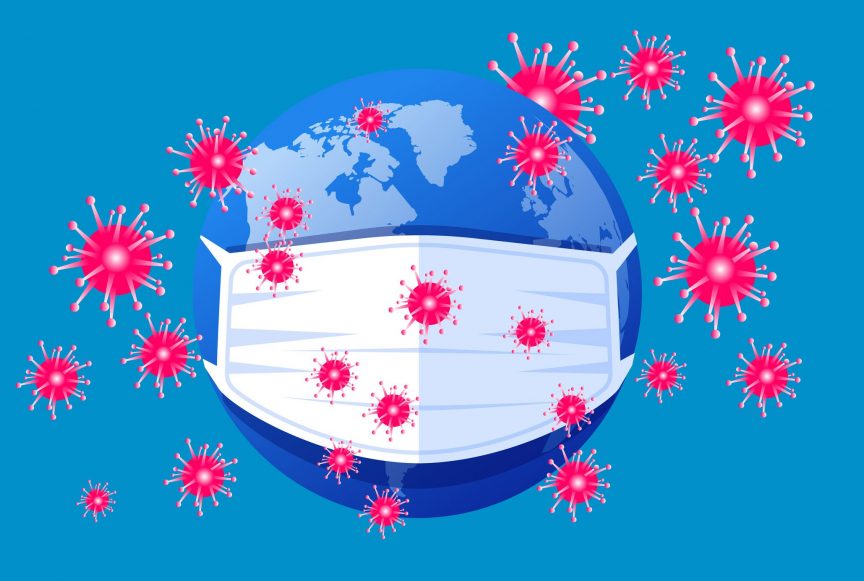
2019 novel coronavirus pneumonia spreading worldwide,Virus crisis, planet wearing medical mask
We must come to
terms with living in a new uncertain world
It was a beautiful spring morning. Bright, crisp sunshine dissolved the last vestiges of frost on the grass. Slievenamon lay dome-shaped and familiar in the distance, its edges blurred by a soft rising mist. The sound of birds chattering and chirruping filled the garden, seeping in through the gaps in the windows and doors. I used to think that birds sang for pleasure. I did not know that birdsong was one way in which they defended their territory. As I watched them dart about and fluff their feathers, I felt an affinity with them. I had come to know what it was like to feel threatened, and to have to defend my territory, as the whole country retreated to their homes and sacrificed their personal freedom for the sake of humanity.
Until recently, I never thought that I would experience a
global disaster. I don’t know why I felt invincible. It may be because I have
always lived in a place that has been safe from war, hurricanes, earthquakes
and tsunamis. In October 2010, I visited my sister in Damascus. We visited the souks inside the old walled
city, bargained for pearls and embroidered damask linen, and drank specialist
teas in the outdoor cafes. We had no
idea that within six months many of the places that we had visited would be
bombed, the people we had met killed or forced to flee.
I am sure that those people had felt invincible before the
war and whenever I thought of them, I wondered how they coped with such sudden
and severe disruption in their lives. But I did not ponder that for long. There
were more important things to think about: Family; work; and the million little
things that make up everyday life.
The new coronavirus has caused global destabilisation.
When the first stories flooded in from China, we listened and watched with
interest and compassion. When the crisis
extended to Italy and Spain, we became more acutely aware that not one of us is
immune. Every cough, raised temperature, and muscle ache was Covid-19 until
proven otherwise. Doctors and nurses worried that they had been in contact with
the virus and remained vigilant for symptoms, while also staying at work.
Households with children returning from college practised self-isolation as
best they could while wanting nothing more than to share an embrace. We worried
about our elderly parents at home or in nursing homes and tried to accept that
we could not comfort or reassure them, no matter how much we wanted to.
As a doctor on immunosuppressants, I closed my door to
patients and became a telephone and video doctor only, relying on the others to
do the necessary examinations.
As the weeks have gone by, some of the old familiar
feelings of invincibility are returning. As of today, Ireland has not
experienced a surge in cases, like the UK, US, Italy and Spain. Admissions to
intensive care units have stabilised, and some of the people who required
ventilation have recovered and are now at home.
But it will be a long time before we return to the
carefree pre-Covid days. As Yeats said of a foregone era: “All’s changed.
Changed utterly.”
We may never shake hands in the same way again or visit
our local supermarket without wearing a mask.
It is too early to look for lessons learned, but already I
feel a greater appreciation for what I once had. Ease of travel, a gathering of all the family
generations, a dinner with friends, my monthly book club. And alongside that,
there is gratitude for the more efficient work practices that have emerged and
the recently-weeded flower beds that will bring joy throughout the summer.
My son looked
wistfully out the window and wished out loud for a glimpse into the future.
“Just a peep,” he said. “I would just like to know how things will be a year
from now.” A newly-minted PhD who only a few weeks ago experienced the world as
a cornucopia of possibilities, having to live a restricted life is a temporary
but extremely inconvenient blip. He still believes he is invincible.
I do not tell him that I am happy not to know. Having
experienced a lot more springtimes than he has, I will take this one just as it
is. Who knows what the world will be like this time next year? Certainty is a
cloak we look to put on when we feel the chill of the unknown. But it is an
emperor’s cloak. We make plans and imagine that we are in control, but we are
not.
For now, the sun
rises, leaves have appeared on the trees, flowers are blooming, and birds are
doing their thing. These are the only certainties, but for now this is enough.





Leave a Reply
You must be logged in to post a comment.